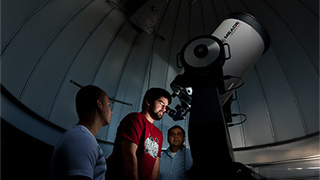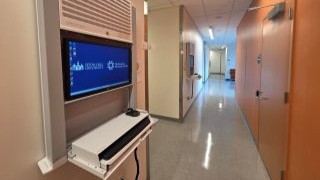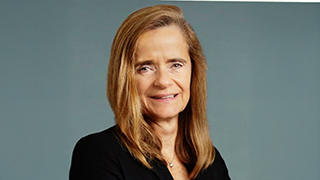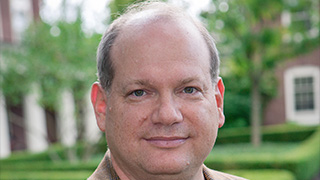SHU-NJSGC (NASA) Academic Year Research Fellowships 2025-26
Friday, September 19, 2025

Seton Hall University Astronomical Observatory
For 2025-26 academic year, Seton Hall University has been awarded four academic year fellowships for science, engineering, or mathematics (STEM) undergraduate students by the New Jersey Space Grant Consortium (NJSGC), a NASA-sponsored program.
Background
The New Jersey Space Grant Consortium was established in 1991 by a grant from NASA. The objectives of the consortium are to develop programs to further aerospace and STEM education, research, and development in New Jersey. For the 2025-26 academic year, NJSGC has awarded Seton Hall University four Academic Year Student Research Fellowships to administer.
Fellowship details
- The fellowship recipient must conduct research relevant to science, technology, engineering and mathematics (STEM) or aerospace and fit into one of NASA’s missions as outlined on the website.
- The fellow must be a full-time student at Seton Hall University. A faculty member in Seton Hall must agree to supervise the research of the fellow.
- Seton Hall University has three fellowships to award in the 2025-26 academic year. The fellowship amount is $2,000 per student.
- The fellowship amount is only for the stipend of the student.
- By NASA mandate, only U.S. citizens are eligible.
- Underrepresented minorities are especially encouraged to apply.
Application process
- Application deadline is October 17, 2025.
- Interested students should submit their application (click here).
- The application should include the completed application form and a one-page research project description from the student with the approval of a faculty supervisor for the project.
- Applications will be reviewed by a committee formed by the faculty of the science departments at Seton Hall.
Award procedures and requirements
- Each fellowship recipient is required to write a 1,000-word report outlining the research they have conducted after the conclusion of the project.
- NJSGC must be properly acknowledged in any publication, presentation, or poster session involving the research.
- NASA requests NJSGC to conduct longitudinal tracking of its fellowship recipients. The fellow will be asked to pledge to provide NJSGC information on their progress and career selection for a period of ten years after the end of the fellowship. Please note: Such information is requested only for statistical purposes and will be published only in aggregate form — names of recipients will remain confidential. The data will be shared only with NASA.
Categories: Research, Science and Technology






